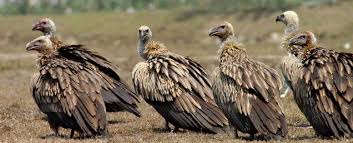International Vulture awareness day: Vultures increasing with ban of Diclofenac

Kathmandu / Sept 5 : The International Vulture Awareness Day (IVAD) is being celebrated organizing various awareness programmes across the world collectively from today.
The week-long event is marked on the first Saturday in September each year. International Vulture Awareness Day is being marked to create awareness about the importance of vultures and to promote the vital work carried out by conservationists around the globe to conserve and protect the birds.
Though the day was being marked since 2005 in South Africa, it got international day status since 2009. However, different programmes were being organised in the past years; the day is being celebrated virtually this year due to pandemic situation caused by the COVID-19 outbreak.
It is stated that five species out of nine found in Nepal are on the verge of extinction. Himalayan vulture, Egyptian vulture, white-rumped vulture, slender-billed vulture, red-headed vulture, cinereous vulture, griffon vulture and bearded vulture are found in Nepal.
The vultures known as nature’s scavengers are alarmingly on the verge of extinction with dwindling nesting habitats compounded by a host of other factors.
They are reportedly vanishing due to climate change, shrinking habitation, use of medicines and lack of prey. The absence of tall trees has also deprived them of a place to build nests.
According to Hari Bhadra Acharya, Information Officer at the National Wildlife Conservation Division, birds are gradually seen after the government banned the use of diclofenac medicine, a veterinary drug present in the livestock carcasses that vultures scavenge on, has largely contributed to causing the extinction of the bird of prey. The drug banned in the treatment of livestock since June 6, 2006.
According to researcher Krishna Bhusal, the number of the vulture is increasing with the ban of diclofenac medicine for the treatment of cattle in Nepal.
Vulture: The leader in cleaning environment
The vulture plays a pivotal part in cleaning the environment as it feeds on animal carrion and prevents environment pollution and frees it from foul smell. As per data, a vulture helps in keeping the environment clean by feeding on an average minimum of 120 kilogrammes animal carcass in a year.
In this way, it also helps in reducing the population of stray dogs, fox, mouse and flies. Reduction in the population of these animals and insect, in turn, helps in prevention of rabies, plague, cholera, dysentery and diarrhea in humans and diseases like anthrax, brucellosis and tuberculosis in cattle, said Bhusal, who is also the programme officer of the Vulture Conservation Programme under the Bird Conservation Association of Nepal.
Vultures have an important role in maintaining balance in ecosystem. It flies hundreds of kilometres in search of its food. It is also known as the nature’s cleaner.
Challenges in vulture conservation
As per a study conducted by the Association, the vulture population has reduced by 91 per cent from 2002 to 2011. However, the rate of decline in the vulture population has decreased in recent years and its population has started to gradually go up.
Still, there are challenges in protecting this bird due to the reduction in food and habitat as well as lack of awareness along with increasing use of diclofenac.
Conservationists have stressed on inter-country partnership in vulture conservation as the efforts of a single country would not be sufficient in this initiative.
To mark the 12th International Vulture Awareness Day today, the Association has released a book containing photos of various facets of the nine species of vultures found in Nepal. The Association believes that this publication will help in the identification and spreading awareness on the conservation of vulture.RSS
